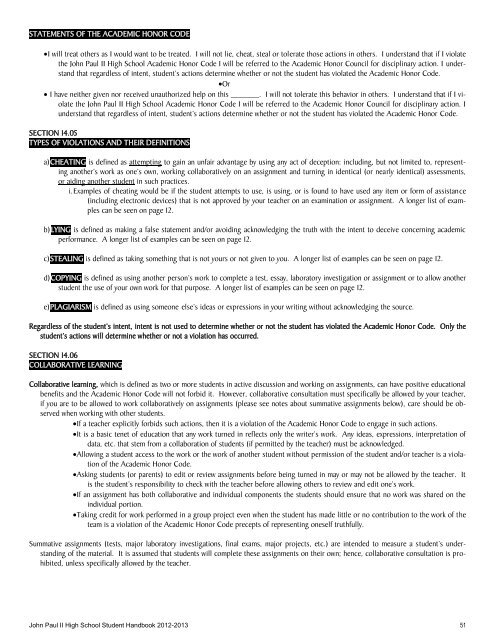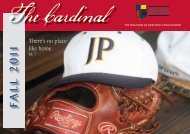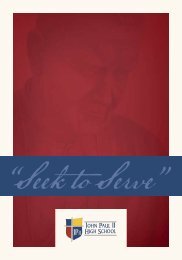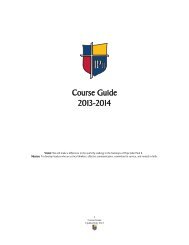JOHN PAUL II HIGH SCHOOL - John Paul II HS
JOHN PAUL II HIGH SCHOOL - John Paul II HS
JOHN PAUL II HIGH SCHOOL - John Paul II HS
You also want an ePaper? Increase the reach of your titles
YUMPU automatically turns print PDFs into web optimized ePapers that Google loves.
STATEMENTS OF THE ACADEMIC HONOR CODE I will treat others as I would want to be treated. I will not lie, cheat, steal or tolerate those actions in others. I understand that if I violatethe <strong>John</strong> <strong>Paul</strong> <strong>II</strong> High School Academic Honor Code I will be referred to the Academic Honor Council for disciplinary action. I understandthat regardless of intent, student’s actions determine whether or not the student has violated the Academic Honor Code. Or I have neither given nor received unauthorized help on this _______. I will not tolerate this behavior in others. I understand that if I violatethe <strong>John</strong> <strong>Paul</strong> <strong>II</strong> High School Academic Honor Code I will be referred to the Academic Honor Council for disciplinary action. Iunderstand that regardless of intent, student’s actions determine whether or not the student has violated the Academic Honor Code.SECTION 14.05TYPES OF VIOLATIONS AND THEIR DEFINITIONSa) CHEATING is defined as attempting to gain an unfair advantage by using any act of deception: including, but not limited to, representinganother’s work as one’s own, working collaboratively on an assignment and turning in identical (or nearly identical) assessments,or aiding another student in such practices.i. Examples of cheating would be if the student attempts to use, is using, or is found to have used any item or form of assistance(including electronic devices) that is not approved by your teacher on an examination or assignment. A longer list of examplescan be seen on page 12.b) LYING is defined as making a false statement and/or avoiding acknowledging the truth with the intent to deceive concerning academicperformance. A longer list of examples can be seen on page 12.c) STEALING is defined as taking something that is not yours or not given to you. A longer list of examples can be seen on page 12.d) COPYING is defined as using another person’s work to complete a test, essay, laboratory investigation or assignment or to allow anotherstudent the use of your own work for that purpose. A longer list of examples can be seen on page 12.e) PLAGIARISM is defined as using someone else’s ideas or expressions in your writing without acknowledging the source.Regardless of the student’s intent, intent is not used to determine whether or not the student has violated the Academic Honor Code. Only thestudent’s actions will determine whether or not a violation has occurred.SECTION 14.06COLLABORATIVE LEARNINGCollaborative learning, which is defined as two or more students in active discussion and working on assignments, can have positive educationalbenefits and the Academic Honor Code will not forbid it. However, collaborative consultation must specifically be allowed by your teacher,if you are to be allowed to work collaboratively on assignments (please see notes about summative assignments below), care should be observedwhen working with other students. If a teacher explicitly forbids such actions, then it is a violation of the Academic Honor Code to engage in such actions. It is a basic tenet of education that any work turned in reflects only the writer’s work. Any ideas, expressions, interpretation ofdata, etc. that stem from a collaboration of students (if permitted by the teacher) must be acknowledged. Allowing a student access to the work or the work of another student without permission of the student and/or teacher is a violationof the Academic Honor Code. Asking students (or parents) to edit or review assignments before being turned in may or may not be allowed by the teacher. Itis the student’s responsibility to check with the teacher before allowing others to review and edit one’s work. If an assignment has both collaborative and individual components the students should ensure that no work was shared on theindividual portion. Taking credit for work performed in a group project even when the student has made little or no contribution to the work of theteam is a violation of the Academic Honor Code precepts of representing oneself truthfully.Summative assignments (tests, major laboratory investigations, final exams, major projects, etc.) are intended to measure a student’s understandingof the material. It is assumed that students will complete these assignments on their own; hence, collaborative consultation is prohibited,unless specifically allowed by the teacher.<strong>John</strong> <strong>Paul</strong> <strong>II</strong> High School Student Handbook 2012-2013 51




![ATHLETIC HANDBOOK â [approved July 29, 2005] - John Paul II HS](https://img.yumpu.com/35453028/1/190x245/athletic-handbook-a-approved-july-29-2005-john-paul-ii-hs.jpg?quality=85)




